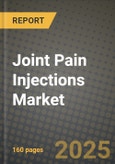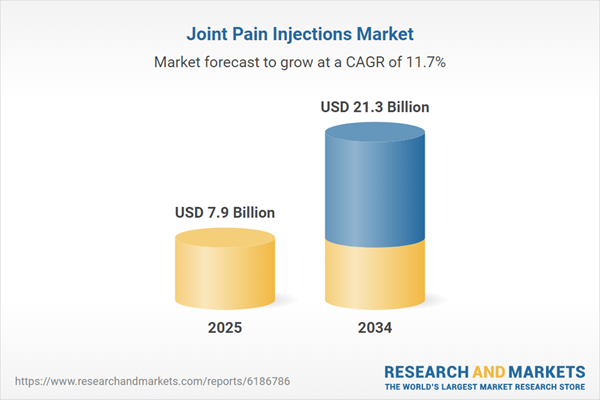The Joint Pain Injections Market addresses the growing global need for non-surgical pain relief among individuals suffering from osteoarthritis, rheumatoid arthritis, and sports-related injuries. These injections - such as corticosteroids, hyaluronic acid, and platelet-rich plasma (PRP) - offer localized treatment for inflammation and joint degeneration, especially in the knees, hips, shoulders, and spine. With aging populations, sedentary lifestyles, and increasing obesity rates contributing to joint-related disorders, minimally invasive therapies are gaining popularity. Healthcare providers, orthopedic specialists, and pain clinics are at the forefront of administering these treatments. The market continues to expand as patients seek faster recovery, lower downtime, and alternatives to long-term oral medication or surgery.
The joint pain injections market saw rising adoption across outpatient and ambulatory care settings. Corticosteroids remained the dominant segment for short-term inflammation control, while demand surged for hyaluronic acid-based viscosupplements, particularly in North America and Asia-Pacific. PRP and stem cell therapies gained visibility due to their regenerative promise, despite inconsistent reimbursement and regulatory variation. Companies like Bioventus, Anika Therapeutics, and Zimmer Biomet introduced next-gen injectables with improved viscosity, longer-lasting relief, and lower immunogenicity. Medical tourism for pain management procedures rose, especially in countries offering affordable, accredited orthopedic services. Physicians increasingly embraced image-guided injection techniques to improve accuracy and treatment outcomes.
The joint pain injections market is expected to evolve with more biologic-based and targeted therapies. Growth will be driven by the expansion of orthobiologics, such as autologous conditioned plasma (ACP), as research validates their efficacy in cartilage regeneration. Digital health platforms and AI-assisted imaging will improve treatment precision and patient follow-up. Combination therapies - mixing corticosteroids with HA or biologics - will gain clinical favor as part of personalized pain management. Meanwhile, regulatory harmonization across regions could support wider adoption of PRP and cell-based injectables. With the rise in musculoskeletal disorders across demographics, joint pain injections will continue to offer a vital, minimally invasive pathway for pain relief and mobility restoration.
Key Insights: Joint Pain Injections Market
- The analyst highlights the growing adoption of platelet-rich plasma (PRP) and orthobiologic injections for joint pain management, driven by interest in regenerative medicine and non-pharmacologic treatment alternatives.
- Image-guided injection techniques using ultrasound and fluoroscopy are trending, allowing physicians to improve targeting accuracy, minimize discomfort, and ensure better intra-articular delivery of injectables.
- According to the analyst, dual-action or combination injection therapies - such as corticosteroids plus hyaluronic acid - are gaining popularity for balancing rapid relief with sustained joint lubrication.
- Home-based follow-up monitoring through digital health apps is trending, with patients tracking pain scores and mobility post-injection to support real-time outcomes reporting.
- Medical tourism for joint injections is rising, with patients seeking affordable access to advanced injectable therapies in countries with established orthopedic reputations and favorable pricing.
- The analyst identifies the growing burden of osteoarthritis and joint degeneration among aging populations as a primary driver for demand in minimally invasive pain management injections.
- Increased preference for non-surgical treatments and faster recovery options is driving patients toward injectable therapies over prolonged oral medications or joint replacement surgery, says the analyst.
- The analyst notes that clinical advancements in formulation viscosity, duration of action, and biocompatibility are enhancing physician confidence in injectable solutions.
- Greater insurance coverage and reimbursement clarity for certain injection types in developed markets are facilitating broader patient access to these treatments.
- The analyst highlights inconsistent reimbursement policies across countries as a major barrier, particularly for PRP and stem cell therapies, limiting their affordability and mainstream use.
- According to the analyst, lack of long-term clinical evidence and variable patient responses create uncertainty around the efficacy and repeatability of certain biologic injection therapies.
Joint Pain Injections Market Segmentation
By Type Of Injection
- Steroid Joint Injection
- Hyaluronic Acid Injections
- Platelet-Rich Plasma (PRP) Injections
- Placental Tissue Matrix (PTM) Injections
- Other Type Of Injections
By Joint Type
- Hip Joint
- Knee and Ankle
- Shoulder and Elbow
- Facet Joints Of The Spine
- Other Joint Types
By Distribution channel
- Hospital Pharmacies
- Retail Pharmacies
- Online Pharmacies
Key Companies Analysed
- Medtronic plc
- Balt Extrusion LLC.
- Stryker Corporation
- MicroPort Scientific Corporation
- Boston Scientific Corporation
- Acandis GmbH
- Admedes Schuessler GmbH
- MicroVention Inc.
- Phenox GmbH
- Terumo Corporation
- Johnson & Johnson Services Inc.
- Abbott Laboratories
- Brainlab AG
- Cardiatis SA
- Cook Medical LLC
- DePuy Synthes
- Endologix Inc.
- InspireMD Inc.
- Integra LifeSciences Corporation
- Kaneka Corporation
- Kerecis Limited
- Penumbra Inc.
- Rapid Medical Ltd.
- Vascular Solutions Inc.
- W. L. Gore & Associates Inc.
- Biotronik SE & Co. KG
- Cardionovum GmbH
- Codman Neuro
- C.R. Bard Inc.
- Cerebral Stents.
Joint Pain Injections Market Analytics
The report employs rigorous tools, including Porter’s Five Forces, value chain mapping, and scenario-based modeling, to assess supply-demand dynamics. Cross-sector influences from parent, derived, and substitute markets are evaluated to identify risks and opportunities. Trade and pricing analytics provide an up-to-date view of international flows, including leading exporters, importers, and regional price trends.Macroeconomic indicators, policy frameworks such as carbon pricing and energy security strategies, and evolving consumer behavior are considered in forecasting scenarios. Recent deal flows, partnerships, and technology innovations are incorporated to assess their impact on future market performance.
Joint Pain Injections Market Competitive Intelligence
The competitive landscape is mapped through proprietary frameworks, profiling leading companies with details on business models, product portfolios, financial performance, and strategic initiatives. Key developments such as mergers & acquisitions, technology collaborations, investment inflows, and regional expansions are analyzed for their competitive impact. The report also identifies emerging players and innovative startups contributing to market disruption.Regional insights highlight the most promising investment destinations, regulatory landscapes, and evolving partnerships across energy and industrial corridors.
Countries Covered
- North America - Joint Pain Injections market data and outlook to 2034
- United States
- Canada
- Mexico
- Europe - Joint Pain Injections market data and outlook to 2034
- Germany
- United Kingdom
- France
- Italy
- Spain
- BeNeLux
- Russia
- Sweden
- Asia-Pacific - Joint Pain Injections market data and outlook to 2034
- China
- Japan
- India
- South Korea
- Australia
- Indonesia
- Malaysia
- Vietnam
- Middle East and Africa - Joint Pain Injections market data and outlook to 2034
- Saudi Arabia
- South Africa
- Iran
- UAE
- Egypt
- South and Central America - Joint Pain Injections market data and outlook to 2034
- Brazil
- Argentina
- Chile
- Peru
Research Methodology
This study combines primary inputs from industry experts across the Joint Pain Injections value chain with secondary data from associations, government publications, trade databases, and company disclosures. Proprietary modeling techniques, including data triangulation, statistical correlation, and scenario planning, are applied to deliver reliable market sizing and forecasting.Key Questions Addressed
- What is the current and forecast market size of the Joint Pain Injections industry at global, regional, and country levels?
- Which types, applications, and technologies present the highest growth potential?
- How are supply chains adapting to geopolitical and economic shocks?
- What role do policy frameworks, trade flows, and sustainability targets play in shaping demand?
- Who are the leading players, and how are their strategies evolving in the face of global uncertainty?
- Which regional “hotspots” and customer segments will outpace the market, and what go-to-market and partnership models best support entry and expansion?
- Where are the most investable opportunities - across technology roadmaps, sustainability-linked innovation, and M&A - and what is the best segment to invest over the next 3-5 years?
Your Key Takeaways from the Joint Pain Injections Market Report
- Global Joint Pain Injections market size and growth projections (CAGR), 2024-2034
- Impact of Russia-Ukraine, Israel-Palestine, and Hamas conflicts on Joint Pain Injections trade, costs, and supply chains
- Joint Pain Injections market size, share, and outlook across 5 regions and 27 countries, 2023-2034
- Joint Pain Injections market size, CAGR, and market share of key products, applications, and end-user verticals, 2023-2034
- Short- and long-term Joint Pain Injections market trends, drivers, restraints, and opportunities
- Porter’s Five Forces analysis, technological developments, and Joint Pain Injections supply chain analysis
- Joint Pain Injections trade analysis, Joint Pain Injections market price analysis, and Joint Pain Injections supply/demand dynamics
- Profiles of 5 leading companies - overview, key strategies, financials, and products
- Latest Joint Pain Injections market news and developments
Additional Support
With the purchase of this report, you will receive:- An updated PDF report and an MS Excel data workbook containing all market tables and figures for easy analysis.
- 7-day post-sale analyst support for clarifications and in-scope supplementary data, ensuring the deliverable aligns precisely with your requirements.
- Complimentary report update to incorporate the latest available data and the impact of recent market developments.
This product will be delivered within 1-3 business days.
Table of Contents
Companies Mentioned
- Medtronic PLC
- Balt Extrusion LLC.
- Stryker Corporation
- MicroPort Scientific Corporation
- Boston Scientific Corporation
- Acandis GmbH
- Admedes Schuessler GmbH
- MicroVention Inc.
- Phenox GmbH
- Terumo Corporation
- Johnson & Johnson Services Inc.
- Abbott Laboratories
- Brainlab AG
- Cardiatis SA
- Cook Medical LLC
- DePuy Synthes
- Endologix Inc.
- InspireMD Inc.
- Integra LifeSciences Corporation
- Kaneka Corporation
- Kerecis Limited
- Penumbra Inc.
- Rapid Medical Ltd.
- Vascular Solutions Inc.
- W. L. Gore & Associates Inc.
- Biotronik SE & Co. KG
- Cardionovum GmbH
- Codman Neuro
- C.R. Bard Inc.
- Cerebral Stents.
Table Information
| Report Attribute | Details |
|---|---|
| No. of Pages | 160 |
| Published | October 2025 |
| Forecast Period | 2025 - 2034 |
| Estimated Market Value ( USD | $ 7.9 Billion |
| Forecasted Market Value ( USD | $ 21.3 Billion |
| Compound Annual Growth Rate | 11.6% |
| Regions Covered | Global |
| No. of Companies Mentioned | 30 |









